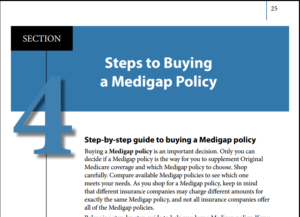Getting a Medicare Supplement with a pre-existing condition is certainly not impossible. However, it can be a challenge. A pre-existing condition is defined differently by different insurance companies, but in general, a simple definition is that a pre-existing condition is a medical condition that exists before an insurance policy goes into effect.
There are many angles to this issue, including what your pre-existing condition is, where you live, what Medicare Supplement company you are considering, and how long you’ve had the pre-existing condition.
How to Get a Medigap Plan with a Pre-Existing Condition?
The surest and easiest way to ensure that you get the Medigap plan that you want, in spite of any pre-existing conditions, is to apply for a plan during your initial open enrollment window. This means that your medical records will not be checked, you will not have to answer any medical questions and your application will be automatically approved.
But if that ship has already sailed, and you want to either sign up for a plan for the first time or change Medigap plans, you should follow the five guidelines below to give you the best chance at being approved:
- Be truthful. There is no upside to lying on an insurance application. The downsides are both civil penalties and the potential loss of your insurance.
- Use an independent Medicare broker. An independent broker should be familiar with the underwriting guidelines of various insurance companies. These guidelines vary tremendously. Because they are aware of the guidelines for multiple companies, a broker can help you compare options that are more likely to work in your specific situation.
- Be prepared. This applies primarily to the telephone interview with an underwriter that will likely be required. You should expect this and be upfront, honest and succinct on that telephone call.
- Be willing to go the extra mile. Insurance companies receive tons of applications every day. To them, you are just a name on a piece of paper. But if you can provide additional information on the application or through a letter from your treating physician, for example, this can make a difference. Sometimes, this may mean getting “rejected” then appealing the decision with additional information or more details.

- Don’t give up if it doesn’t work out. Insurance companies change their applications all the time. Plus, new insurance companies are always entering the Medigap market. Also, and most importantly, the longer-standing your pre-existing condition is, the more likely an insurance company is to view it as an acceptable “risk”.
When Can You Be Denied Medigap Coverage Based on a Pre-Existing Condition?
First of all, it is easy to understand that the best time to sign up for a Medicare Supplement plan (also known as Medigap) is during your initial Medigap open enrollment window. This period lasts for 6 months and begins on the 1st day of the month that you are 65 or older and enrolled in Medicare Part B. During this time period, you cannot be turned down for Medigap coverage for any reason from any company.
After that 6 month period, there are some other instances, referred to as “Guaranteed issue” situations, during which you can obtain certain Medigap plans without medical questions or medical underwriting. An example would be if you are already on Medicare A and B and have a group plan that is terminating. These “guaranteed issue” situations are limited both in scope, and they also limit which plans you can sign up for (for example, Plan F is offered on a “guaranteed issue” basis in these situations whereas Plan G is not).
If you are NOT in open enrollment or guaranteed issue, you will have to “qualify medically” for a Medigap plan. This means that you will have to answer medical questions on an application, possibly have a phone interview with an underwriter and authorize disclosure of pharmaceutical records for the purpose of approving, or declining, your application.
There are some states that are exceptions to this (CT, NY, VT) and some that have annual open enrollment periods that coincide with either your birthday or your policy anniversary date (CA, WA, OR, MO).
What Pre-Existing Conditions Do Medigap Companies Ask About?
The answer to this is… it depends. It depends on where you live and what companies are asking the questions. Some companies are more stringent than others. If you are ARE in really good health, you may want to consider going with a company that IS stringent on underwriting, as this can lead to more rate stability over time.
Speaking generally, though, insurance companies ask about the last 2-3 years in most cases, and they ask about chronic/ongoing conditions as well as any major surgeries/procedures. If you are someone who takes a couple of maintenance-type medications for cholesterol and high blood pressure, you should not have any problem “passing” underwriting. If, however, you had a stent placed last year, take blood thinners and are a Type 2 diabetic, your chances of approval would be minimal with most companies.
The insurance company questionnaires that ask the medical questions do vary from company to company. But they are similar in that they are “yes” or “no” questions, and your answers to those questions are not the only factor used to determine your eligibility.
Insurance companies also access electronic medical records and pharmaceutical records in the process of approving or declining your application. Overall, as we always tell people, they will know more about you, medically, than you may know about yourself prior to approving your application.
Pre-Existing Condition and Medigap: Where You Live Matters
As mentioned above, there are three states which prohibit medical questions and excluding people on the basis of pre-existing conditions for Medigap plans – CT, NY and VT. Incidentally, Medigap rates in these states are higher than most other states. Plus, there are a few other states that have annual periods during which you can change your Medigap coverage (CA, MO, OR and WA).
It is crucial to be aware of the state-specific guidelines and company-specific questions for your state when you are considering Medigap coverage. The easiest way to do that is to have an independent broker that is familiar with a variety of insurance companies – what health questions they ask, etc – to provide his or her free assistance in comparing the options. (How to pick the best Medigap plan for you)
What About After You Have a Medigap Plan?
Once you are approved onto a Medigap plan, any conditions you develop would not impact your coverage. Medigap policies can never be cancelled on the basis of your health. Likewise, you can never be required to pay more because you have health problems.
It is crucial to always be truthful on your Medigap application (frankly, insurance companies will likely find you out anyway!), as if you are found to have misled or lied on your application, your policy could be rescinded. But you are not liable for a condition that you did not reasonably know that you have. In other words, if you take out a Medigap policy and get sick the day after you take out, that does not mean that your policy will be cancelled or that you will not be covered.
_____________________
65Medicare.org is a leading, independent Medicare insurance  agency for people turning 65 and going on Medicare. We have worked with 10,000+ Medicare-eligible individuals over the last 10+ years, assisting with understanding and comparing the plans. You can get a list of Medigap quotes in your area. Or, if you have any questions about this information, you can contact us online or call us at 877.506.3378.
agency for people turning 65 and going on Medicare. We have worked with 10,000+ Medicare-eligible individuals over the last 10+ years, assisting with understanding and comparing the plans. You can get a list of Medigap quotes in your area. Or, if you have any questions about this information, you can contact us online or call us at 877.506.3378.

